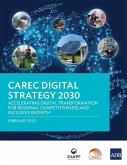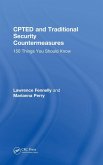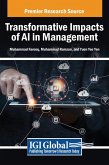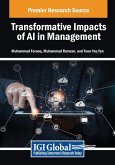Digital Strategy and Governance in Transformative Technologies
Herausgeber: Perdana, Arif; Karim, Ridoan; Bharathi, S Vijayakumar
Digital Strategy and Governance in Transformative Technologies
Herausgeber: Perdana, Arif; Karim, Ridoan; Bharathi, S Vijayakumar
- Gebundenes Buch
- Merkliste
- Auf die Merkliste
- Bewerten Bewerten
- Teilen
- Produkt teilen
- Produkterinnerung
- Produkterinnerung
Digital Strategy and Governance in Transformative Technologies offers a comprehensive exploration of how emerging technologies are reshaping business operations, governance structures, and societal interactions.
Andere Kunden interessierten sich auch für
![CAREC Digital Strategy 2030 CAREC Digital Strategy 2030]() Asian Development BankCAREC Digital Strategy 203038,99 €
Asian Development BankCAREC Digital Strategy 203038,99 €![Navigating the Cyber Maze Navigating the Cyber Maze]() Matthias MuhlertNavigating the Cyber Maze150,99 €
Matthias MuhlertNavigating the Cyber Maze150,99 €![CPTED and Traditional Security Countermeasures CPTED and Traditional Security Countermeasures]() Lawrence FennellyCPTED and Traditional Security Countermeasures235,99 €
Lawrence FennellyCPTED and Traditional Security Countermeasures235,99 €![Clockwork Game Design Clockwork Game Design]() Keith BurgunClockwork Game Design152,99 €
Keith BurgunClockwork Game Design152,99 €![Digital Workplace Strategy & Design Digital Workplace Strategy & Design]() Oscar BergDigital Workplace Strategy & Design13,99 €
Oscar BergDigital Workplace Strategy & Design13,99 €![Transformative Impacts of AI in Management Transformative Impacts of AI in Management]() Muhammad FarooqTransformative Impacts of AI in Management321,99 €
Muhammad FarooqTransformative Impacts of AI in Management321,99 €![Transformative Impacts of AI in Management Transformative Impacts of AI in Management]() Muhammad FarooqTransformative Impacts of AI in Management245,99 €
Muhammad FarooqTransformative Impacts of AI in Management245,99 €-
-
-
Digital Strategy and Governance in Transformative Technologies offers a comprehensive exploration of how emerging technologies are reshaping business operations, governance structures, and societal interactions.
Produktdetails
- Produktdetails
- Verlag: CRC Press
- Seitenzahl: 482
- Erscheinungstermin: 9. September 2025
- Englisch
- Abmessung: 240mm x 161mm x 30mm
- Gewicht: 884g
- ISBN-13: 9781032762715
- ISBN-10: 1032762713
- Artikelnr.: 73777784
- Herstellerkennzeichnung
- Libri GmbH
- Europaallee 1
- 36244 Bad Hersfeld
- gpsr@libri.de
- Verlag: CRC Press
- Seitenzahl: 482
- Erscheinungstermin: 9. September 2025
- Englisch
- Abmessung: 240mm x 161mm x 30mm
- Gewicht: 884g
- ISBN-13: 9781032762715
- ISBN-10: 1032762713
- Artikelnr.: 73777784
- Herstellerkennzeichnung
- Libri GmbH
- Europaallee 1
- 36244 Bad Hersfeld
- gpsr@libri.de
Arif Perdana is an Associate Professor and the Director of Action Lab Indonesia at Monash University. He has held academic positions at the University of Queensland, the Singapore Institute of Technology, and Aarhus University. His expertise spans digital strategy and data science, with research focusing on responsible AI, blockchain, and machine learning. He has secured funding from institutions such as the Singapore Government, Bank Indonesia, and the Monash Data Futures Institute. Dr. Perdana has also led professional training workshops, presented at global conferences, and published in leading journals in information systems-related disciplines. S Vijayakumar Bharathi is a Professor at the Symbiosis Centre for Information Technology, Symbiosis International (Deemed University). He holds postgraduate degrees in commerce and management and a PhD in computer science from Symbiosis International University, specializing in enterprise resource planning (ERP) risk assessment for Small and Medium Enterprises. A member of the SAP Academic Alliance Board (Asia Pacific and Japan), he is a global SAP trainer and researcher in intelligent ERP, blockchain, and technology adoption. He collaborates with SAP headquarters and leads global curriculum pilot projects. Ridoan Karim is a Lecturer in Business Law and the Deputy Director of the Centre for Commercial Law and Regulatory Studies (CLARS), Malaysia Hub, Monash University Malaysia. His research spans contract and cyber law, energy transition, and sustainable finance. He has served as a consultant on government-funded projects and has been collaborating with the Monash Data Futures Institute. Recognized for his research excellence, he received the Monash School of Business Excellence Award in 2022. He earned a PhD at the University of Malaya. Saru Arifin is an Associate Professor at the Faculty of Law, Universitas Negeri Semarang, Indonesia. He earned a PhD in human rights law at the University of Pécs, Hungary. His research focuses on public international law, human rights law, and legislation studies, with publications by Routledge, Brill, and Sage. Dr. Arifin is actively involved in academic organizations such as GAJE and ISILL. He also serves as the Director of Programs at the Institute for Migrant Rights and is a member of APJHI's Ethical Committee (2024-2029). Aashish Srivastava researches law and technology. He earned a BS, LLB and Diploma in cyber law in India, and he earned a PhD in electronic signatures at Monash University. His dissertation was published by Springer, and he has published several articles in the area of IT law in journals such as Information Technology and People, Journal of Business Law, Common Law World Review, Rutgers Computer and Technology Law Review, Computers Law and Security Review, and International Journal of Law and Information Technology. Dr. Srivastava has more than ten years of experience in teaching commercial law, marketing law, and IT law to business students at Monash Business School. His research and supervision interests include e-commerce, cybersecurity, e-crimes, and legal issues in cyberbullying and hazing (ragging).
Part 1: Introduction to the Digital Frontier and Strategic Foundations. 1.
The Intersection of Digital Strategy and Technology Landscapes: Overcoming
Convergence Challenges. 2. Strategic Foundations of the Digital Frontier.
3. Tracing the Evolution of Digital Strategy with AI, Blockchain, Cloud,
and Cryptocurrencies. Part 2: AI in Strategy: From Law to Ethical
Alignment. 4. Strategizing AI: Integrating Ethics and Environmental
Sustainability in Digital Healthcare and Legal Systems. 5. Assessing the
Efficacy of Artificial Intelligence (AI) Applications in Predictive
Policing: A Systematic Review Method. 6. Neurobiological Foundations of AI:
Tracing the Evolution of Neural Networks. 7. The Urgency of Artificial
Intelligence (AI) for the Enhancement of Maritime Cultural Heritage
Management in Indonesia. 8. Artificial Intelligence and the Future of
Software Development: Transforming the Software Development Lifecycle in
the Digital Era. Part 3: Blockchain and Governance: Enhancing Trust and
Accountability. 9. Immutable Transparency: Leveraging Blockchain
Transparency Features to Foster Trust in Decentralized Systems. 10. The
Ethical Ledger: A Review of Literature on the Alignment of Accounting
Ethics and Blockchain Technology. 11. Using Blockchain Technology for Audit
Trail. 12. A Blockchain-Enabled Digital Strategy for Agriculture Trade. 13.
Blockchain Accountability Strategy of ESG-Focused Cryptocurrency Projects.
Part 4: Cryptocurrencies: Strategizing in a Decentralized Financial
Landscape. 14. Cryptocurrency Integration in the Web 3.0 Ecosystem:
Opportunities, Challenges, and Future Directions. 15. Cryptocurrency
Regulations in India: Opportunities and Challenges. 16. A Case Study on
Cryptocurrency Strategy and Regulation in the Asia Pacific. Part 5:
Navigating the Legal and Ethical Landscapes of the Metaverse. 17.
Navigating the Legal Landscape of the Metaverse. 18. Virtual Rape:
Parallels between Physical and Virtual Violation in the Metaverse. Part 6:
Policy and Governance in the Digital Era. 19. An Analysis of Meta's
Political Ad Policy Enforcement: Perspectives from Bangladesh. 20.
Regulating E-Waste Management in the Digital Era: A Legal and Policy
Analysis.
The Intersection of Digital Strategy and Technology Landscapes: Overcoming
Convergence Challenges. 2. Strategic Foundations of the Digital Frontier.
3. Tracing the Evolution of Digital Strategy with AI, Blockchain, Cloud,
and Cryptocurrencies. Part 2: AI in Strategy: From Law to Ethical
Alignment. 4. Strategizing AI: Integrating Ethics and Environmental
Sustainability in Digital Healthcare and Legal Systems. 5. Assessing the
Efficacy of Artificial Intelligence (AI) Applications in Predictive
Policing: A Systematic Review Method. 6. Neurobiological Foundations of AI:
Tracing the Evolution of Neural Networks. 7. The Urgency of Artificial
Intelligence (AI) for the Enhancement of Maritime Cultural Heritage
Management in Indonesia. 8. Artificial Intelligence and the Future of
Software Development: Transforming the Software Development Lifecycle in
the Digital Era. Part 3: Blockchain and Governance: Enhancing Trust and
Accountability. 9. Immutable Transparency: Leveraging Blockchain
Transparency Features to Foster Trust in Decentralized Systems. 10. The
Ethical Ledger: A Review of Literature on the Alignment of Accounting
Ethics and Blockchain Technology. 11. Using Blockchain Technology for Audit
Trail. 12. A Blockchain-Enabled Digital Strategy for Agriculture Trade. 13.
Blockchain Accountability Strategy of ESG-Focused Cryptocurrency Projects.
Part 4: Cryptocurrencies: Strategizing in a Decentralized Financial
Landscape. 14. Cryptocurrency Integration in the Web 3.0 Ecosystem:
Opportunities, Challenges, and Future Directions. 15. Cryptocurrency
Regulations in India: Opportunities and Challenges. 16. A Case Study on
Cryptocurrency Strategy and Regulation in the Asia Pacific. Part 5:
Navigating the Legal and Ethical Landscapes of the Metaverse. 17.
Navigating the Legal Landscape of the Metaverse. 18. Virtual Rape:
Parallels between Physical and Virtual Violation in the Metaverse. Part 6:
Policy and Governance in the Digital Era. 19. An Analysis of Meta's
Political Ad Policy Enforcement: Perspectives from Bangladesh. 20.
Regulating E-Waste Management in the Digital Era: A Legal and Policy
Analysis.
Part 1: Introduction to the Digital Frontier and Strategic Foundations. 1.
The Intersection of Digital Strategy and Technology Landscapes: Overcoming
Convergence Challenges. 2. Strategic Foundations of the Digital Frontier.
3. Tracing the Evolution of Digital Strategy with AI, Blockchain, Cloud,
and Cryptocurrencies. Part 2: AI in Strategy: From Law to Ethical
Alignment. 4. Strategizing AI: Integrating Ethics and Environmental
Sustainability in Digital Healthcare and Legal Systems. 5. Assessing the
Efficacy of Artificial Intelligence (AI) Applications in Predictive
Policing: A Systematic Review Method. 6. Neurobiological Foundations of AI:
Tracing the Evolution of Neural Networks. 7. The Urgency of Artificial
Intelligence (AI) for the Enhancement of Maritime Cultural Heritage
Management in Indonesia. 8. Artificial Intelligence and the Future of
Software Development: Transforming the Software Development Lifecycle in
the Digital Era. Part 3: Blockchain and Governance: Enhancing Trust and
Accountability. 9. Immutable Transparency: Leveraging Blockchain
Transparency Features to Foster Trust in Decentralized Systems. 10. The
Ethical Ledger: A Review of Literature on the Alignment of Accounting
Ethics and Blockchain Technology. 11. Using Blockchain Technology for Audit
Trail. 12. A Blockchain-Enabled Digital Strategy for Agriculture Trade. 13.
Blockchain Accountability Strategy of ESG-Focused Cryptocurrency Projects.
Part 4: Cryptocurrencies: Strategizing in a Decentralized Financial
Landscape. 14. Cryptocurrency Integration in the Web 3.0 Ecosystem:
Opportunities, Challenges, and Future Directions. 15. Cryptocurrency
Regulations in India: Opportunities and Challenges. 16. A Case Study on
Cryptocurrency Strategy and Regulation in the Asia Pacific. Part 5:
Navigating the Legal and Ethical Landscapes of the Metaverse. 17.
Navigating the Legal Landscape of the Metaverse. 18. Virtual Rape:
Parallels between Physical and Virtual Violation in the Metaverse. Part 6:
Policy and Governance in the Digital Era. 19. An Analysis of Meta's
Political Ad Policy Enforcement: Perspectives from Bangladesh. 20.
Regulating E-Waste Management in the Digital Era: A Legal and Policy
Analysis.
The Intersection of Digital Strategy and Technology Landscapes: Overcoming
Convergence Challenges. 2. Strategic Foundations of the Digital Frontier.
3. Tracing the Evolution of Digital Strategy with AI, Blockchain, Cloud,
and Cryptocurrencies. Part 2: AI in Strategy: From Law to Ethical
Alignment. 4. Strategizing AI: Integrating Ethics and Environmental
Sustainability in Digital Healthcare and Legal Systems. 5. Assessing the
Efficacy of Artificial Intelligence (AI) Applications in Predictive
Policing: A Systematic Review Method. 6. Neurobiological Foundations of AI:
Tracing the Evolution of Neural Networks. 7. The Urgency of Artificial
Intelligence (AI) for the Enhancement of Maritime Cultural Heritage
Management in Indonesia. 8. Artificial Intelligence and the Future of
Software Development: Transforming the Software Development Lifecycle in
the Digital Era. Part 3: Blockchain and Governance: Enhancing Trust and
Accountability. 9. Immutable Transparency: Leveraging Blockchain
Transparency Features to Foster Trust in Decentralized Systems. 10. The
Ethical Ledger: A Review of Literature on the Alignment of Accounting
Ethics and Blockchain Technology. 11. Using Blockchain Technology for Audit
Trail. 12. A Blockchain-Enabled Digital Strategy for Agriculture Trade. 13.
Blockchain Accountability Strategy of ESG-Focused Cryptocurrency Projects.
Part 4: Cryptocurrencies: Strategizing in a Decentralized Financial
Landscape. 14. Cryptocurrency Integration in the Web 3.0 Ecosystem:
Opportunities, Challenges, and Future Directions. 15. Cryptocurrency
Regulations in India: Opportunities and Challenges. 16. A Case Study on
Cryptocurrency Strategy and Regulation in the Asia Pacific. Part 5:
Navigating the Legal and Ethical Landscapes of the Metaverse. 17.
Navigating the Legal Landscape of the Metaverse. 18. Virtual Rape:
Parallels between Physical and Virtual Violation in the Metaverse. Part 6:
Policy and Governance in the Digital Era. 19. An Analysis of Meta's
Political Ad Policy Enforcement: Perspectives from Bangladesh. 20.
Regulating E-Waste Management in the Digital Era: A Legal and Policy
Analysis.








